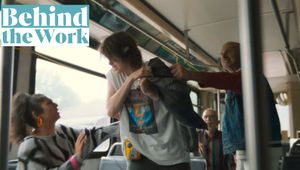
Laura’s Word 16 January 2014

The best advertising, so the glib seminar wisdom goes, is the work that divides people. To love something or hate it requires a real emotional connection. The last thing you want to be is ‘blah’. And so, judging by that metric, the latest Thinkmodo prank campaign ‘Devil Baby Attack’ is a piece of stellar marketing. The video nasty for horror movie Devil’s Due sees an animatronic infant terrorise the streets of New York has split social media reaction – and even the LBB team – in two.
The sight of projectile vomiting, a swearing baby and countless screamers, shriekers and jumpers inspired a chorus of evil chuckles from the resident grindhouse fans while others were left distinctly unimpressed. And – at the risk of sounding like a misery – I think I’m in the second camp. There’s no denying the craft and ingenuity of the prank. The animatronic baby is brilliant and it’s fun to catch a glimpse of the engineering team putting him together. But there’s just something that doesn’t quite sit right.
Thinkmodo’s previous piece of horror prankvertising for Carrie, which saw a girl explode with telekinetic powers in an ordinary coffee shop, was an instant hit and has clocked up over 52 million views. It was ingenious, unexpected and fantastic.
So what’s so different about the demon baby? The coffee prank unfolded at the other corner of the room from the spectators, whereas this stunt happens right in peoples’ faces. It’s punishing people for doing a nice thing. The passers by see a pram, abandoned, and head over to check if there’s a baby in there and if it’s ok. That’s good. It’s nice to see people in a busy city taking the time to do a kind thing. There’s not enough of that around these days and I’m not sure exploiting our better natures for some cheap giggles is a worthwhile endeavour. Feeling protective of babies, reacting to their cries, is something we’ve evolved to do – and so the humour comes from laughing at people doing what they're pre-programmed to do. God I sound grumpy.
I’m one of those people who never got desensitized to horror films. I refuse to do ghost trains. I once fell over in fright during a late night ghost tour around Edinburgh. And the thought that brands and agencies could barge into peoples’ lives, uninvited, and frighten them makes me angry. Being one of life’s low-threshold scaredy cats, I found it pretty easy to put myself in the shoes of the prank’s apparently unsuspecting victims. I know online privacy has gone the way of the dinosaurs and brands will stop at nothing to intrude on every part of an individual’s life, but shouldn’t we be able to walk down the street with their heart unattacked and underpants unsoiled?
Members of the public are considered fair game as trends like crowd-sourced advertising, flash mobs and event-based shoots show no sign of dying off. And in most cases the very worst they can expect is some mild inconvenience, as the creative in question is designed to inspire delight or intrigue. But fear is a far riskier emotion to play with unsolicited. Who will laugh and who will leave the encounter feeling stressed and unhappy? Who will punch the cameraman? Emotion is a physical phenomenon as much as a mental one – and when the fight-or-flight response is triggered, stress hormones are released, heart rates go up, palms sweat, and muscles tense. Reportedly everyone involved found the experience, in retrospect, quite a funny one but does that excuse an unconsensual horror show?
Of course the likelihood that the viral was filmed with actors rather than real members of the public is pretty high. But while that solves the ethical issues it does somewhat leave stunt advertising somewhat toothless and actually a bit dull. There’s only so many times you can gamefully ignore awkward fake reaction shots. And after a certain point all you’re really seeing is reiterations of the same idea.
Judging by the online discussions around the ad, I’m not the only one to have reservations about Demon Baby Attack. On the other hand it has lots of fans and has been viewed over five million times since Tuesday. But is divisive, shocking advertising necessarily effective? Despite the success of the coffee shop stunt, the Carrie remake underperformed at cinemas. I guess we’ll have to wait for the film to be released to find out.















